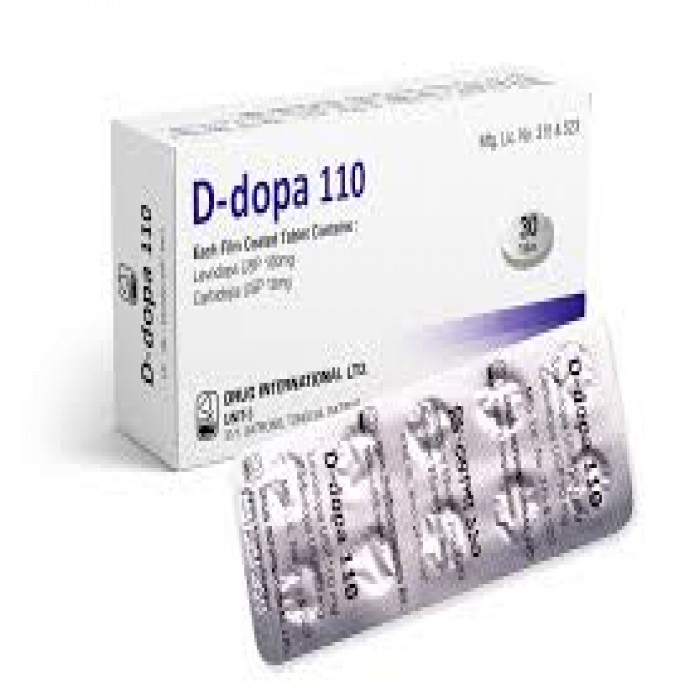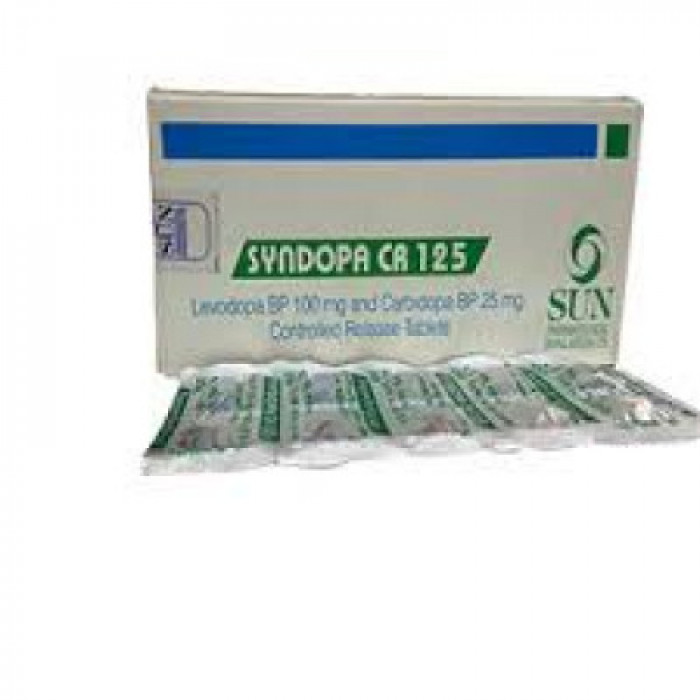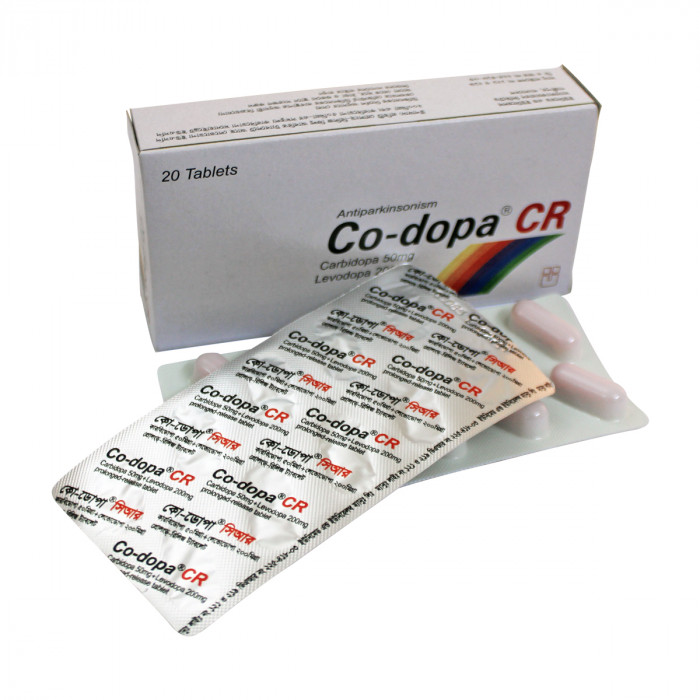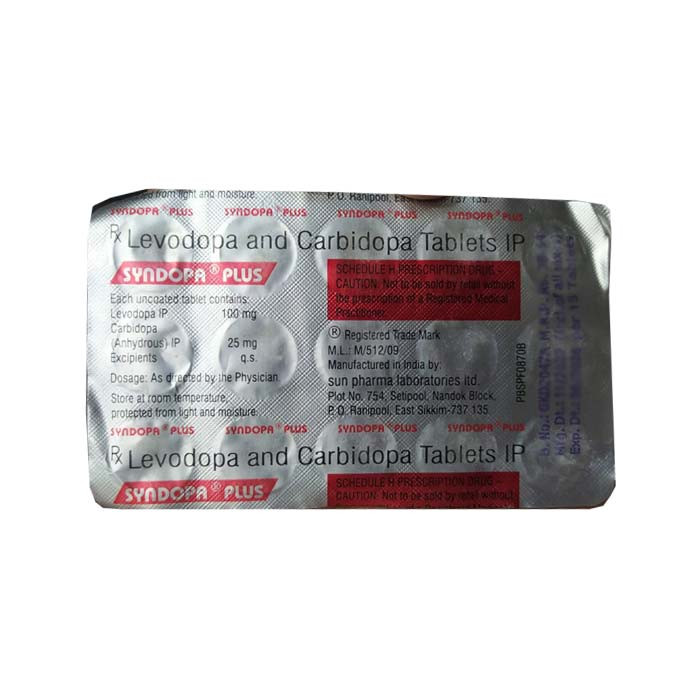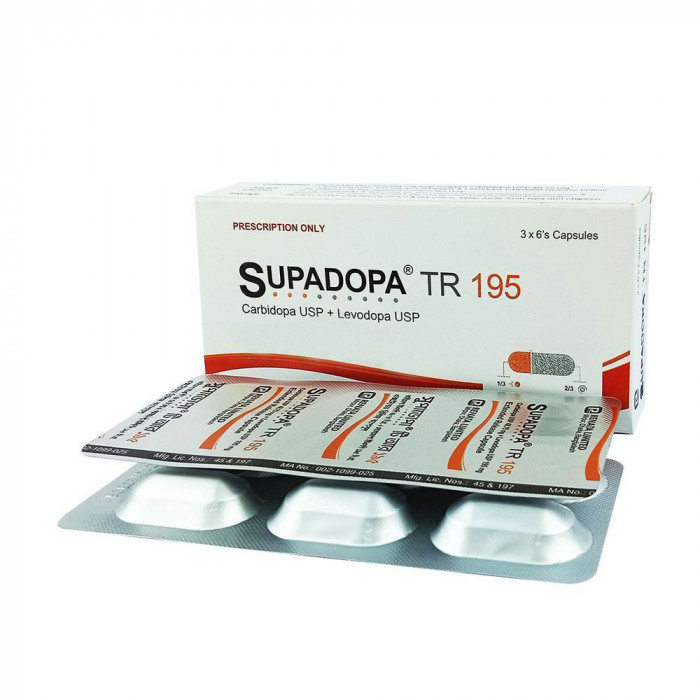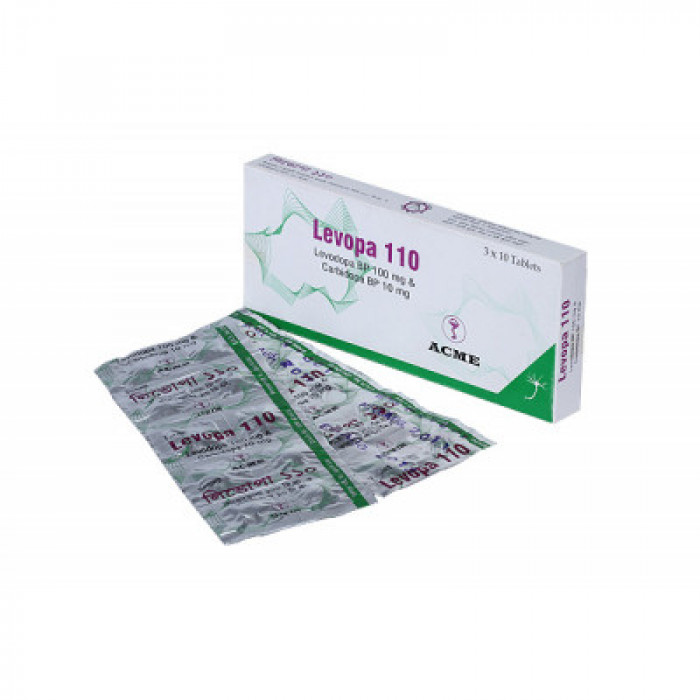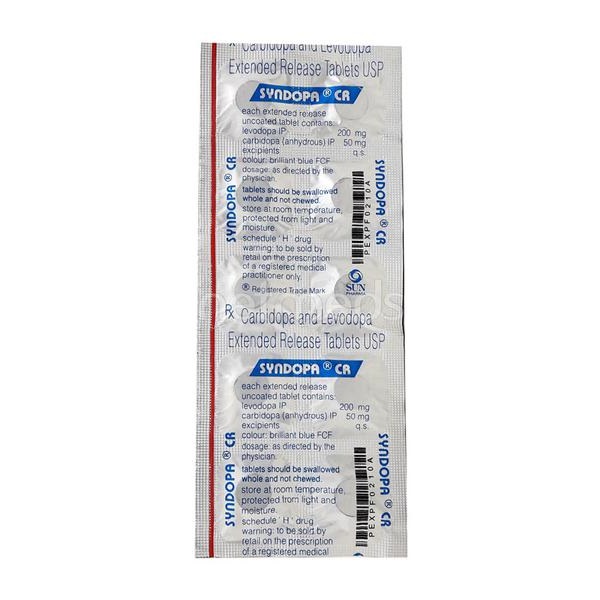

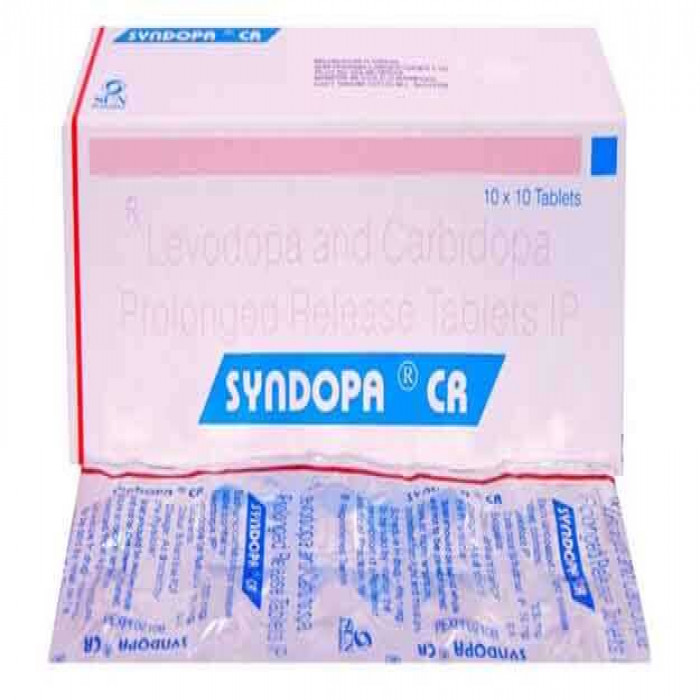
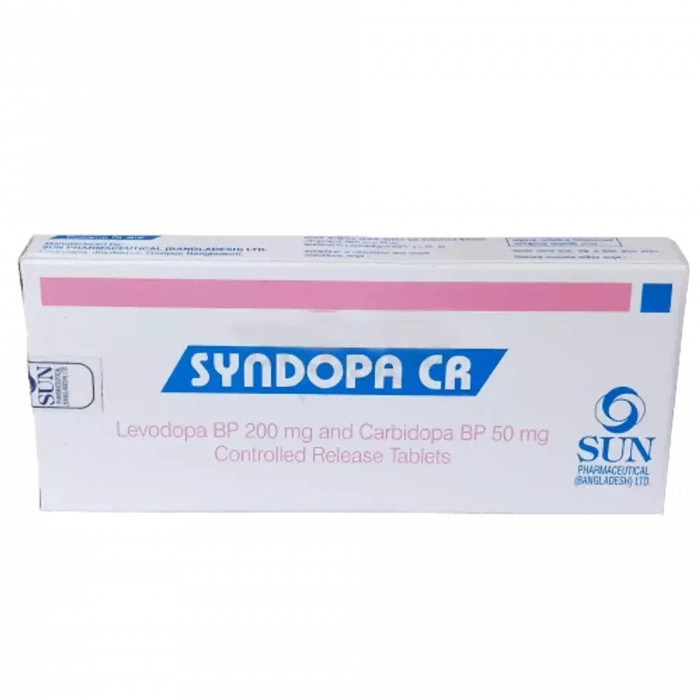
✔ 100% Authentic Product
👁️ Currently Viewing 436
Syndopa CR 250mg Tablet 10pcs
Syndopa CR 250mg Tablet is a combination of two medicines: Levodopa and Carbidopa. This medication is used to treat the symptoms of Parkinson's disease like tremors (shaking), stiffness, and slowness of movement. These symptoms are caused due to the lack of dopamine, a natural substance usually found in the brain.

✅ Description:
- Syndopa CR 250mg Tablet is a combination medicine that consists of Levodopa and Carbidopa.
- It is used to treat the symptoms of Parkinson's disease (a brain disorder that affects movement with symptoms such as tremors, shakiness, stiffness, difficulty in walking, impaired balance and coordination, etc.).
- Syndopa CR 250mg Tablet may be taken with or without food as directed by your doctor. The dose and duration of treatment will be decided by your doctor based on the severity of your condition. Take it at the same time every day to maintain a constant level of medicine in your body. Do not stop taking this medicine without consulting your doctor, as your symptoms could become worse.
- Syndopa CR 250mg Tablet is not recommended for use if you are allergic to it.
- Inform your doctor if you have depression, other mental conditions, liver or kidney problems, or any other health conditions before taking this medicine. Inform your doctor about all your current medicines to avoid any undesired effects.
- Syndopa CR 250mg Tablet is not recommended for use in children below 18 years of age as the safety and efficacy data are not clinically established.
- Consult your doctor if you are pregnant, planning a pregnancy, or are breastfeeding.
Safety Advices

Alcohol
UNSAFE
Consumption of alcohol is not recommended during treatment with Syndopa CR 250 Tablet as it may increase the risk of side effects like depression and impairment of judgment, thinking, and psychomotor skills.

Pregnancy
CONSULT YOUR DOCTOR
Syndopa CR 250 Tablet is generally not recommended for use during pregnancy as animal studies indicate that it may harm the developing fetus. Hence, consult your doctor if you are pregnant.

Breastfeeding
CONSULT YOUR DOCTOR
Syndopa CR 250 Tablet is not recommended for use while breastfeeding as it is not known if this medicine passes into breast milk. Consult your doctor if you are breastfeeding.

Driving
UNSAFE
Avoid driving vehicles or operating machines after taking this medicine, as it can make you feel dizzy.

Kidney
CONSULT YOUR DOCTOR
Syndopa CR 250 Tablet should be used with caution if you have kidney problems as this medicine is filtered and excreted through your kidneys. If your kidneys are not working properly, it may lead to the accumulation of this medicine in the body and increase the risk of undesired effects. Your doctor may adjust the dose of this medicine or prescribe a suitable alternative based on your clinical condition.

Liver
CONSULT YOUR DOCTOR
Syndopa CR 250 Tablet should be used with extreme caution if you have liver problems as this medicine is broken down in the liver. If your liver is not working properly, it may cause an accumulation of this medicine, resulting in toxicity. Your doctor may suggest tests to monitor your liver function while you are taking this medicine.
✔️ Uses of Syndopa CR 250mg Tablet
- Parkinson's Disease
✔️ How does Syndopa CR 250mg Tablet work?
Levodopa works by being converted to dopamine in the brain. Carbidopa works by preventing levodopa from being broken down before it reaches the brain.
By increasing the amount of dopamine in the brain, Levodopa+Carbidopa helps control the symptoms of Parkinson’s disease and helps you to perform daily activities such as dressing, walking, handling utensils, etc.
✔️ Side Effects of Syndopa CR 250mg Tablet
- Hallucinations
- Dry mouth
- Confusion
- Abnormal dreams
- Nausea and Vomiting
- Trouble sleeping
- Loss of appetite
- Fatigue
- Uncontrolled body movements
✔️ Quick Suggestions:
- Reduce/avoid a high-protein diet (e.g. meat, poultry, and dairy products) while you are taking the medicine as it can reduce the amount of medication absorbed by your body.
- Syndopa CR 250mg Tablet can cause drowsiness and rarely sudden sleep episodes without warnings. Hence, avoid performing activities that require mental alertness such as driving vehicles or operating machines while you are taking this medicine.
- Syndopa CR 250 Tablet may cause bronchospasm (narrowing of the airways). Hence, it is not recommended for use if you have respiratory conditions that cause narrowing of the airways and breathing difficulties, such as asthma and COPD (Chronic Obstructive Pulmonary Disease).
- Syndopa CR 250mg Tablet may increase the risk of depression and suicidal tendencies. Hence, consult your doctor immediately if you experience changes in mood and behavior or develop suicidal thoughts.
- Syndopa CR 250 Tablet is not recommended for use in children less than 18 years of age as the safety and efficacy data are not clinically established.
✔️ Indication of Syndopa CR 250mg Tablet
Syndopa CR 250mg Tablet is prescribed for the treatment of Parkinson's disease and Parkinson's syndrome. It alleviates symptoms such as rigidity and bradykinesia, and it also helps with tremors, difficulty swallowing, excessive saliva, and postural instability. Additionally, it improves motor recovery after a stroke when used prior to physiotherapy.
✔️ Pharmacology
Levodopa and carbidopa are combined to treat Parkinson's disease and symptoms similar to Parkinson's that result from encephalitis or poisoning by carbon monoxide or manganese. Parkinson's symptoms like tremors, stiffness, and slow movement are due to a dopamine deficiency in the brain. Levodopa, a central nervous system agent, converts into dopamine in the brain. Carbidopa, a decarboxylase inhibitor, prevents the breakdown of levodopa before it reaches the brain, allowing for lower doses and reducing side effects like nausea and vomiting.
✔️ Dosage & Administration of Syndopa CR 250mg Tablet
For patients switching from conventional levodopa/decarboxylase inhibitor combinations: Start with a dose that is no more than 10% higher than the current daily levodopa intake, especially for those taking more than 900 mg per day. Increase the interval between doses by 30-50%, ranging from 4 to 12 hours. Smaller doses, if divided unequally, should be taken later in the day. Dosages may need further adjustment based on clinical response, potentially increasing up to 30%.
Conversion from conventional to controlled-release tablets:
- 300-400 mg conventional: 400 mg controlled release, 1 tablet 2x daily
- 500-600 mg conventional: 600 mg controlled release, 1 tablet 3x daily
- 700-800 mg conventional: 800 mg controlled release, 4 tablets in 3-4 divided doses
- 900-1000 mg conventional: 1000 mg controlled release, 5 tablets in 3 or more divided doses
- 1100-1200 mg conventional: 1200 mg controlled release, 6 tablets in 3 or more divided doses
- 1300-1400 mg conventional: 1400 mg controlled release, 7 tablets in 3 or more divided doses
- 1500-1600 mg conventional: 1600 mg controlled release, 8 tablets in 3 or more divided doses
For patients previously on levodopa alone: Discontinue levodopa at least 8 hours before starting this controlled-release medication. For mild to moderate disease, start with one tablet twice daily.
For patients not on levodopa: For mild to moderate disease, start with one tablet twice daily. Initial doses should not exceed 600 mg of levodopa per day, nor be administered at intervals of less than six hours.
Titration: Adjust doses and intervals based on therapeutic response. Most patients respond well to 2-8 tablets per day, in divided doses every 4-12 hours. Higher doses and shorter intervals can be used but are not usually recommended. An interval of at least three days between adjustments is advised.
Maintenance: Regular clinical evaluations are needed to adjust the dosage as Parkinson’s disease progresses.
Addition of other medications: Anticholinergic agents, dopamine agonists, and amantadine can be used with this medication, but dosage adjustments may be necessary.
Interruption of therapy: Monitor patients closely if abrupt reduction or discontinuation is needed, especially if they are on antipsychotics.
✔️ Interaction
Introducing carbidopa-levodopa in patients on antihypertensives may cause postural hypotension, requiring adjustments in antihypertensive dosages. Combining with tricyclic antidepressants can lead to hypertension and dyskinesia. Iron supplements may reduce the bioavailability of carbidopa and levodopa. Dopamine-2 receptor antagonists and some other medications can diminish levodopa’s effects. Combining with selegiline may cause severe orthostatic hypotension.
✔️ Contraindications
Avoid in patients with hypersensitivity to the components, narrow-angle glaucoma, suspicious skin lesions, or a history of melanoma.
✔️ Pregnancy & Lactation
The effects on human pregnancy are unknown, but animal studies suggest potential risks. Carbidopa and levodopa should only be used in women of childbearing age when the benefits outweigh the risks. The excretion of carbidopa in human milk is unclear; caution is advised due to potential adverse reactions in nursing infants.
✔️ Precautions & Warnings
- Carbidopa-levodopa is not recommended for drug-induced extrapyramidal reactions.
- Patients previously on levodopa alone should discontinue it at least 12 hours before starting this combination.
- Observe for dyskinesias and depression with suicidal tendencies. Use with caution in patients with severe pulmonary, cardiovascular, kidney, liver, or endocrine disease, or a history of peptic ulcers or seizures.
- Monitor cardiac function in patients with a history of myocardial infarction.
- Make sure it is not consumed by pets, children, and other people.
- Patients with wide-angle glaucoma should be closely monitored.
✔️ Storage Conditions:
Store in a cool, dry place, protected from light.
Disclaimer:
ePharma sole intention is to ensure that its consumers get proper
information as musch as possible. Although we do not guarantee the
accuracy and the completeness of the information that provided and
here information is for informational purposes only.
The information contained herein should NOT be used as a substitute
for the advice of a qualified physician. This may not cover
everything about particular health conditions,
lab tests, medicines, all possible side effects, drug interactions,
warnings, alerts, etc. Please consult your healthcare professional
and discuss all your queries related to any disease or medicine. We
intend to support, not replace, the doctor-patient relationship.




